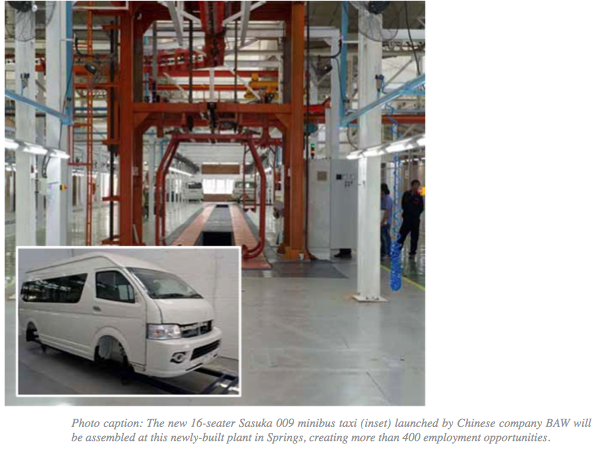Gauteng plant gears up locals to assemble taxis
Gauteng plant gears up locals to assemble taxis sadminA group of students gather around a table stacked with car parts, listening to a Chinese engineer instructing them on how to assemble a vehicle.
 This is the scene at the Beijing Automobile Works (BAW) workshop in Springs, Gauteng where the first recruits are being trained by the Chinese company to assemble the new Sasuka minibus taxis.
This is the scene at the Beijing Automobile Works (BAW) workshop in Springs, Gauteng where the first recruits are being trained by the Chinese company to assemble the new Sasuka minibus taxis.
The 11 students surrounding the table piled with car parts including a steering wheel, engine and exhaust pipes, are the first to undergo on-the-job training in assembling parts onto the 16-seater Sasuka 009.
The minibus is designed and developed by BAW under its international brand.
Following an agreement between BAW and the Industrial Development Corporation (IDC), BAW has set up this assembly plant in South Africa. The plan is for these minibuses, which look like Toyota Quantum vehicles, to be manufactured locally in future.
The IDC has invested R22.9 million in the project.
The company will hire 80 more people this month. When it reaches full capacity, the company will have 400 people on its payroll.
Malibongwe Godla, 41, is part of the fi t group to be trained.
“I am very happy that I got a job. What I like most about it is that I am being trained and receiving skills on how to fit parts onto a car. This will grow my own skills and even if I decide to leave the company, I can still survive on my own because I have the necessary mechanical skills,” he said.
Being employed by BAW has restored Godla’s dignity, as he is now able to provide for his family. He is proud of the skills he has gained.
“I now know the different types of equipment for fi parts onto cars. I can also identify the parts and know how each equipment makes the car function better,” he said, while pointing at the engine, side mirrors and exhaust.
The plant was officially opened by Minister of Economic Development Ebrahim Patel two months ago.
The BAW and IDC project falls under a Department of Trade and Industry programme aimed at developing the local bus, truck and minibus industry, which started in 2010.
Since 2007, South Africa has not manufactured any of the minibus taxis that the public uses daily, Patel said.
“South Africa’s entire annual demand of 22 000 to 23 000 minibus taxis was imported. As this annual demand is expected to increase to about 28 000 by 2015, the level of imports of minibus taxis would have increased sharply in the next few years. In the space of a few months, this is changing,” he added.
Toyota also opened a taxi assembly line in Prospecton, Durban in April 2012, the Minister said.
“The result will be that about two-thirds of the annual demand for taxis will be assembled in South Africa from next year. This is a solid achievement over a short period. We see the assembly of taxis as a step towards full localisation and manufacture of taxis in South Africa.”
The project will not only supply the South African market but will also create export opportunities for the rest of Africa.
“While there are about 200 000 taxis on the road in South Africa, it is estimated that there are a further 100 000 in the rest of Southern Africa. About 50 per cent of the annual demand is in South Africa. The total project investment is estimated at R196 million from all shareholders,” Minister Patel said.
The Sasuka minibuses arrive from China in a container with the body intact. The plant in Springs then fits other parts onto the vehicle. “We want to train the students the proper way. We want to train them for as long as they need training,” said Gerald Brookshaw, BAW’s manager in product and quality.
The Sasuka minibuses will be available at dealerships across the country from February. The recruitment process selecting those to work and train at the plant is being done with the Department of Labour.